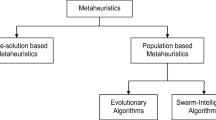Abstract
Combinatorial configurations of different types are studied. A new point of view is proposed for their classification. Three recurrent combinatorial operators are introduced, and used to form different types of combinatorial configurations.
Similar content being viewed by others
REFERENCES
K. A. Rybnikov, Introduction to Combinatorial Analysis [in Russian], Izd. Mosk. Univ., Moscow (1985).
G. Andrews, The Theory of Partitions [Russian translation], Nauka, Moscow (1982).
A. Kaufmann, Introduction a la Combinatorique en Vue des Applications [Russian translation], Nauka, Moscow (1975).
M. H. Hall, Combinatorial Theory [Russian translation], Mir, Moscow (1970).
V. N. Sachkov, Combinatorial Methods in Discrete Mathematics [in Russian], Nauka, Mocow (1977).
R. Stanley, Enumerative Combinatorics [Russian translation], Mir, Moscow (1990).
L. Ya. Savel'ev, Combinatorics and Probability [in Russian], Nauka, Novosibirsk (1975).
N. Ya. Vilenkin, Combinatorics [in Russian], Nauka, Moscow (1969).
H. J. Ryser, Combinatorial Mathematics [Russian translation], Mir, Moscow (1966).
M. L. Platonov, Combinatorial Numbers of a Class of Mappings and their Applications [in Russian], Nauka, Moscow (1979).
S. N. Yablonskii, Introduction to Discrete Mathematics [in Russian], Nauka, Moscow (1986).
W. Lipski, Kombinatorika dla Programistov [Russian translation], Mir, Moscow (1988).
J. Riordan, Combinatorial Identities [Russian translation], Nauka, Moscow (1952).
V. I. Baranov and B. S. Stechkin, Extremal Combinatorial Problems and their Applications [in Russian], Nauka, Moscow (1989).
E. Reingold, J. Nievergelt, and N. Deo, Combinatorial Algorithms. Theory and Practice [Russian translation], Mir, Moscow (1980).
Yu. V. Korzhenevich, Combinatorial Problems: Olympiads on Programming [in Russian], Universitetskoe, Minsk (1989).
N. V. Bilous, Z. V. Dudar, N. S. Lesna, and I. Yu. Shutin, Fundamentals of Combinatorial Analysis [in Ukrainian], KhDTURE, Kharkiv (1999).
I. I. Trut, “Recurrent algorithm of solution of a combinatorial problem on permutations with constraints,” Diskret. Matem., 11, Issue 2, 112-117 (1999).
V. P. Pinchuk, “Table invariants and construction of efficient calculations of graphs,” in: Theory of Calculations [in Russian], Inst. Kibern. im. V. M. Glushkova NANU, Kiev (1999), pp. 289-293.
C. D. Savage, “Generating permutations with k-differences,” SIAM J. Discrete Math., 3, No. 4, 561-573 (1990).
G. A. Freiman and J. Pitman, “Partition into distinct large parts,” J. Austral. Math. Soc. A, 57, No. 3, 386-416 (1994).
Ko Chum Wa and F. Ruskey, “Generating permutations of a bag by interchanges,” Inf. Process Lett., 41, No. 5, 263-269 (1992).
A. G. Kurosh, The Course of Higher Algebra [in Russian], Nauka, Moscow (1968).
N. K. Timofeeva, “Some properties of problems of combinatorial optimization,” in: Theory of Calculations [in Russian], Inst. Kibern. im. V. M. Glushkova NANU, Kiev (1999), pp. 354-358.
O. A. Yemets and E. V. Roskladka, “Solution of a Euclidean combinatorial optimization problem by the dynamic-programming method,” Kibern. Sist. Analiz, No. 1, 138-146 (2002).
K. A. Rybnikov (ed.), Combinatorial Analysis. Problems and Exercises [in Russian], Nauka, Moscow (1982).
N. K. Timofeeva, “Ordering a set of values of an objective function argument in combinatorial optimization,” Kibern. Sist. Analiz, No. 6, 78-87 (1998).
N. K. Timofeeva, “On some properties of partitions of a set into subsets,” USiM, No. 5, 6-23 (2002).
Author information
Authors and Affiliations
Rights and permissions
About this article
Cite this article
Timofeeva, N.K. Methods of Constructing Argument of Objective Function in Combinatorial Optimization Problems. Cybernetics and Systems Analysis 38, 873–878 (2002). https://doi.org/10.1023/A:1022944021651
Issue Date:
DOI: https://doi.org/10.1023/A:1022944021651




